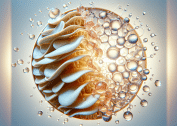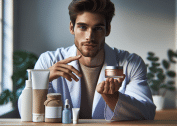Unlock the insider’s path to glowing skin with a guide that explores lifestyle changes, key nutrients, clean beauty principles, and mindful skincare routines. Discover surprising factors that may influence your skin’s radiance for longer-lasting beauty outcomes.
The Foundations Behind Glowing Skin
Radiant, glowing skin often feels like an elusive goal. For many, it seems tied to products or expensive treatments. Yet, scientific research suggests the real secrets may start within daily routines and healthy habits that maximize skin’s natural vibrancy. Hydration, sleep quality, and gentle cleansing form an effective foundation. Healthy skin barriers protect against environmental stressors. Ignoring these basics can lead to dullness and discomfort. Prioritizing fundamental wellness habits helps preserve a youthful complexion and prepares skin to absorb beneficial skincare ingredients (see https://www.aad.org/public/everyday-care/skin-care-basics).
Lack of glowing skin is sometimes connected to hidden lifestyle factors. Chronic stress, inconsistent sleep patterns, or poor hydration can influence skin appearance as much as beauty products themselves. The skin functions as a living organ. It responds to positive changes in diet, movement, and self-care. Reducing stress may mean fewer breakouts and an improved tone. Creating a daily rhythm of mindful routines, such as gentle facial massage or wind-down rituals, can make a surprising difference in how skin feels each morning.
Environmental factors can also impact skin health. Urban air pollution and frequent exposure to UV light cause oxidative stress, accelerating visible aging. Supporting skin’s natural resilience means investing time in broad-spectrum sun protection, antioxidants in the diet, and barrier-strengthening moisturizers. Many dermatologists recommend focusing on these steps as the true foundation of long-term skin glow. It is not only about what appears on the surface, but about supporting the body’s natural protective mechanisms (see https://www.ncbi.nlm.nih.gov/pmc/articles/PMC6017965/).
Key Nutrients That Support Skin Radiance
Nutrition plays a central role in revealing brighter skin. Vitamins A, C, and E are especially vital for supporting collagen, acting as antioxidants, and helping repair damage from environmental stressors. Diets rich in leafy greens, berries, citrus, and seeds nourish the skin from within. Omega-3 fatty acids, found in flaxseeds, walnuts, and fatty fish, can help manage inflammation. Drinking enough water throughout the day further encourages a plump and youthful look (see https://www.hsph.harvard.edu/nutritionsource/vitamins/vitamin-a/).
Emerging evidence ties gut health to skin appearance. Probiotic-rich foods, such as yogurt or fermented vegetables, support balance in the digestive system, which may translate to clearer, more radiant skin. Some studies point to a link between consistent fiber intake and a reduction in certain types of acne. These small dietary changes can add up over time, supporting not only your glow but also your overall well-being. Avoiding excessive processed sugars may also reduce risk for inflammation and uneven tone.
Micronutrient deficiencies sometimes contribute to skin concerns. Zinc, selenium, and biotin are examples of trace elements that play essential roles in cell regeneration and skin barrier function. Including a wide range of whole foods in daily meals can help prevent gaps. For those who experience stubborn skin challenges, consulting a registered dietitian or healthcare professional knowledgeable in nutrition may be worth considering to personalize recommendations for enhanced, longer-lasting results.
Clean Beauty Principles and Ingredient Awareness
Clean beauty is more than a trend; it is a principle focused on using products with safe, non-irritating ingredients. Mindful selection of cleansers, moisturizers, and serums can decrease chances of allergic reactions and support the skin’s natural balance. Reading ingredient labels and choosing products free of synthetic fragrances or harsh sulfates are simple steps that may reduce redness and promote glow. Many skincare brands now offer full ingredient transparency (learn more at https://www.fda.gov/cosmetics/cosmetics-labeling-regulations/cosmetics-labeling-guide).
Awareness around product safety also extends to understanding how active ingredients interact. Niacinamide, hyaluronic acid, and ceramides contribute to hydration and skin softness, while vitamin C serums brighten and protect against free radical damage. It’s important to layer products thoughtfully and avoid combining ingredients that can cause irritation, like retinoids with certain exfoliating acids. Research shows that consistency with well-chosen actives usually brings the best results over time.
For individuals with sensitive or reactive skin, patch testing new products and adopting a minimalist routine can be beneficial. Limiting daily steps to gentle cleansing, targeted treatment, and hydration allows the skin flora to thrive. Some people find that their glow significantly increases by simplifying their routine rather than adding numerous products. Clean beauty principles encourage listening to personal skin needs instead of following trends.
Everyday Habits That Enhance Skin Glow
The journey to luminous skin extends beyond serums and masks. Lifestyle choices such as regular moderate exercise, restful sleep, and stress management significantly impact skin’s glow. Movement promotes healthy blood flow, delivering nutrients to skin cells. Activities like yoga or walking also promote emotional well-being, which in turn affects how the skin reacts and renews itself.
Getting enough quality sleep allows the body to repair daily wear and strengthen skin’s natural defenses. Studies have shown that adults who consistently obtain 7–8 hours of restful sleep display better skin hydration, improved texture, and less pronounced fine lines. Too little sleep can trigger cortisol spikes, which may lead to breakouts and dryness (see https://www.sleepfoundation.org/physical-health/how-sleep-affects-your-skin).
Mindfulness and relaxation techniques—such as meditation, journaling, or simply stepping outside—are linked to better barrier function and more even skin tone. Stress management is vital, as high stress levels can worsen inflammatory conditions like eczema or rosacea. Building positive habits mindfully can lead to small but impactful changes in day-to-day skin radiance.
Smart Skincare Routines That Really Work
No single routine works for every person, but a few classic steps form the backbone of most effective regimens. Gentle morning cleansing removes surface oils and prepares the skin for light hydration and sun protection. In the evening, double cleansing—beginning with a makeup remover or oil followed by a mild cleanser—ensures the skin is clean without stripping essential moisture. Applying hydrating serums and rich moisturizers at night takes advantage of the skin’s natural repair cycle.
Sunscreen remains an essential daily step for maintaining skin glow and preventing visible premature aging. Broad-spectrum sunscreen with at least SPF 30 shields against both UVA and UVB rays. Reapplication is vital, especially for those who spend extended periods outdoors. Skipping this step exposes skin to increased risk of dark spots, dullness, and loss of elasticity over time. (More details at https://www.cdc.gov/cancer/skin/basic_info/prevention.htm).
Weekly exfoliation using gentle, non-abrasive formulas can help maintain smooth texture and encourage cell renewal. Avoiding over-exfoliation is important to prevent sensitivity and protect the skin barrier. Customizing routines according to seasonal changes and personal skin type ensures a consistent, healthy glow. Observing skin’s response and adjusting products as needs change leads to sustainable, visible benefits, rather than sporadic improvement.
Navigating New Trends and Avoiding Common Pitfalls
With the constant flow of beauty trends, some individuals might be tempted to try multiple new products or treatments at once. However, slow and steady integration allows time to observe how each addition affects skin health. Many dermatologists caution against chasing viral trends without evidence or professional recommendations. Instead, focus on consistent routines backed by research and trusted sources (https://www.aad.org/news/skin-care-routines-dermatologist-advice).
Recognizing the difference between marketing claims and science-based results is another vital skill. While certain ingredients, such as retinol and peptides, are proven for supporting skin elasticity, other trend-driven products may lack clear evidence for their benefits. Comparing options through credible sources helps avoid unnecessary expenses and irritation.
Personalization is the ultimate path to a long-lasting glow. Taking notes on what works, making small adjustments, and celebrating gradual progress makes the beauty journey more enjoyable and effective. With mindful decisions and informed perspectives, it’s easier to cultivate glowing skin that feels healthy and looks naturally radiant—without overwhelming routines or disappointment from unchecked trends.
References
1. American Academy of Dermatology. (n.d.). Skin care basics. Retrieved from https://www.aad.org/public/everyday-care/skin-care-basics
2. Pumori Saokar Telang. (2019). Vitamin A, C, and E in Skin Health. NIH/National Library of Medicine. Retrieved from https://www.ncbi.nlm.nih.gov/pmc/articles/PMC6017965/
3. Harvard T.H. Chan School of Public Health. (n.d.). Vitamin A. Retrieved from https://www.hsph.harvard.edu/nutritionsource/vitamins/vitamin-a/
4. Food and Drug Administration. (n.d.). Cosmetics Labeling Regulations. Retrieved from https://www.fda.gov/cosmetics/cosmetics-labeling-regulations/cosmetics-labeling-guide
5. Sleep Foundation. (n.d.). How Sleep Affects Your Skin. Retrieved from https://www.sleepfoundation.org/physical-health/how-sleep-affects-your-skin
6. Centers for Disease Control and Prevention. (n.d.). Skin Cancer Prevention. Retrieved from https://www.cdc.gov/cancer/skin/basic_info/prevention.htm









